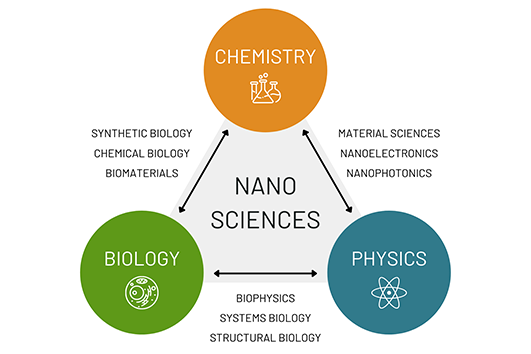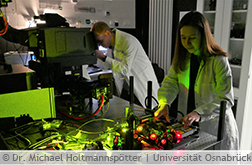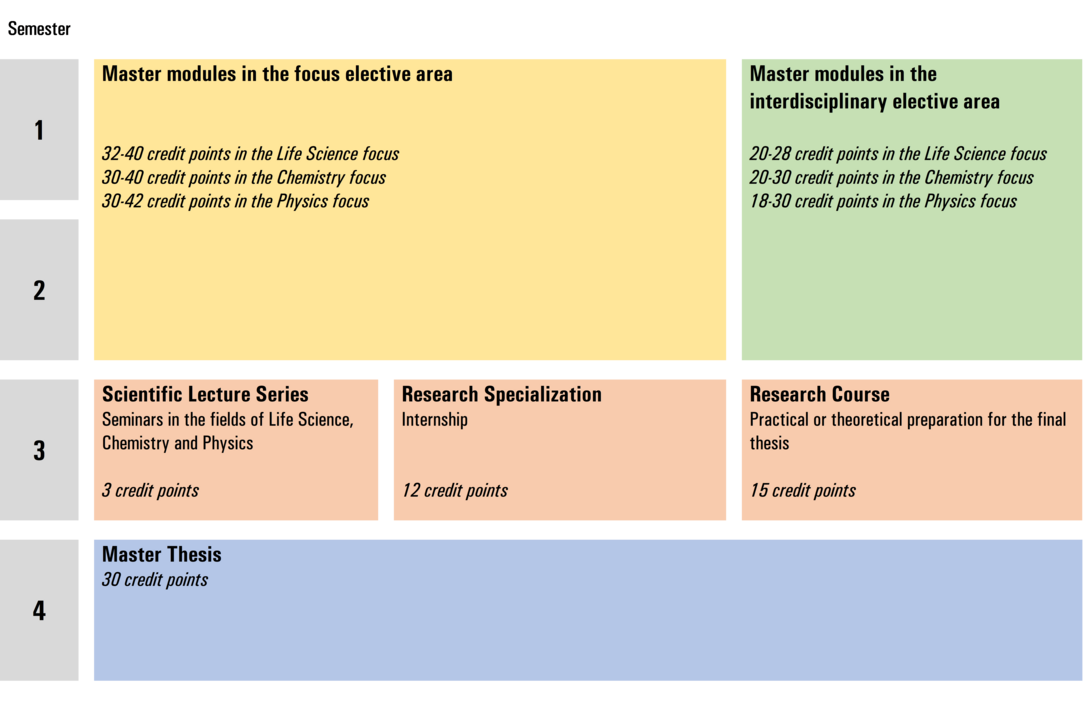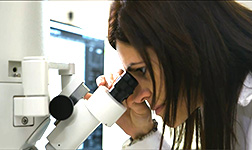Main content
Top content
Nanosciences - Materials, Molecules and Cells Master of Science
What are the hallmarks of the study program?
In the last twenty years, the nanosciences have developed into a highly fruitful cross-sectional discipline of life science, chemistry and physics. A long-standing tradition of interdisciplinary collaborations in the field of nanoscience is a hallmark of the natural sciences at Osnabrück. The Center for Cellular Nanoanalytics (CellNanOs) provides a unique laboratory infrastructure for interdisciplinary method development.


Basic Information
Standard period of study:
Four semesters
Language of instruction:
English
Commencement of studies:
Winter semester
Degree:
Master of Science (MSc)
Contact:
nanoscience@uni-osnabrueck.de
The focus system allows students to deepen the skills they have acquired in one of the three disciplines involved in their Bachelor's degree, as well as to gain a new perspective on the interfaces between the two neighbouring disciplines in the compulsory elective area. The Master's program enables a tailored, research-oriented specialization in the field of "Nanosciences. This concept yields a number of benefits:
- Broad spectrum of master modules from life science, chemistry and physics
- Overarching modules with a strong interdisciplinary orientation
- Individual specialization on different cross-sectional topics, e.g. nanomaterial synthesis, polymer chemistry/supramolecular chemistry, nanobiophysics/structural biology, nanophotonics/microscopy
- High practical content with a strong research orientation already in the first master modules
- Master theses in an interdisciplinary research environment with access to cutting-edge laboratory infrastructure
What kind of career can I pursue with this degree?
Nanosciences and nanotechnology are innovation drivers in very different fields where interdisciplinary expertise plays an important role. In addition to activities in research, development and quality control, a number of other fields are emerging in the area of technology consulting. Typical, economically and technologically highly relevant topics in the nanosciences are:
- Synthesis, characterization and functional integration of nanomaterials, e.g. in the energy sector, for illuminants or cosmetics
- Pharmaceutical research, vaccine development, diagnostics and nanomedicine
- Photonics & laser technology, electronics and sensor technology
- Development and application of microscopy & nanoscopy
For a career in research & development, further qualification by doctoral studies is advised. The interdisciplinary Research Center CellNanOs offers excellent infrastructural and broad thematic opportunities as well as the embedding in comprehensive research initiatives.
How is the degree program structured?
Valid from the winter term 2024/2025
Many modules can be completed flexibly in different semesters. In the two compulsory elective areas of the first half of the programme, a total of 60 credit points must be achieved within the specified corridors. A typical study plan is as follows:

Download study plan (PDF, 40 kB)
1st & 2nd term:
After a joint opening event (kick-off) with subsequent counselling, you will put together a suitable selection for your Master's modules in the focus and interdisciplinary areas. Through a balanced combination of lectures, seminars and exercises, you will deepen your scientific skills in these subjects and familiarise yourself with the subject-specific perspectives on nanosciences.
3rd term:
As part of a research specialisation in a working group of your choice, you will prepare for your Master's thesis in terms of methodology and content. An accompanying research course serves to deepen your understanding of the topic of your project. Initial links to the academic community will be encouraged through regular participation in guest speaker seminars within the participating departments.
4th term:
This intensive preparation enables you to work on the research project for your Master's thesis largely independently and thus further develop your academic work skills. The targeted preparation gives you the best chance of completing a challenging Master's thesis with an interdisciplinary topic within the standard period of study.
Study program regulations
You can find the new study program regulations valid from winter term 2024/2025 probably from September 2024!
What are the admission requirements?
Admission requirements are a qualified degree in a degree program of life science, chemistry, physics, or material sciences or an equivalent degree. Proof of knowledge in the chosen focus (life science, chemistry or physics) must be provided equalling at least eighty credit points. In addition, a total of 30 ECTS credits from the remaining two disciplines must be able to be contributed, e.g. through discipline-related modules in the Bachelor's degree. Missing credit points in the minor may be supplemented by appropriate courses during the first semesters of the master's program. You will find information about the admission requirements in the Regulations on Access and Admission (PDF, 190 kB) (German version).
How do I apply?
Here you can find information about any admission requirements and application deadlines for this program of study.
For the application, you must provide evidence of English ability at theB2 language level.
German citizens with Abitur or other university admission qualifications can apply directly using the Osnabrück University Online-Platform. International applicants who have attended school in Germany and who possess German certification may do the same.
International applicants without German certification should note that different conditions apply to their application procedure in some cases.
Am I expected to study abroad?
The examination regulations do not require any study abroad. However, we recommend that students plan for at least one semester abroad in the course of their studies. You can do this at numerous European and non-European universities in the framework of various exchange programs. Details about these programs are available through the International Office. Up to thirty credit points of academic achievements at another university in Germany or abroad in a degree program relevant to your major can be recognized, as long as this was previously approved by the examining committee (Prüfungsausschuss).
Further study programs
Where can I get more information?
Academic Advising
If you have any questions concerning the study program, the admission requirements and the study contents, please do not hesitate to contact the student advisory service at the Biology, Chemistry or Physics departments.
Student Council
For further information on the degree program you can also contact the student council of Osnabrück Biology, Chemistry or Physics.
Additional Links
Quality Management
This degree program is accredited by the Agency for Quality Assurance (AQAS).





